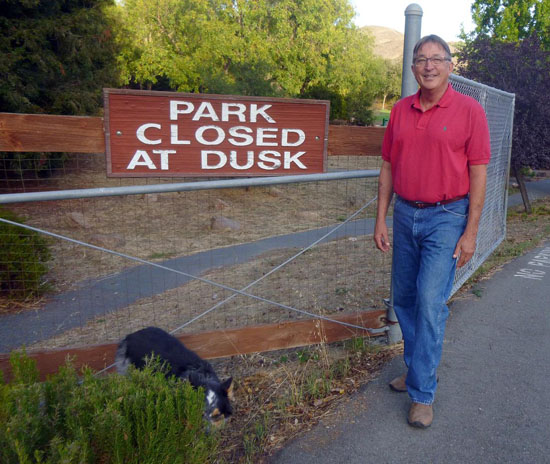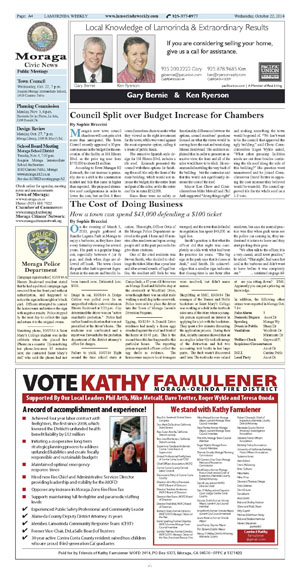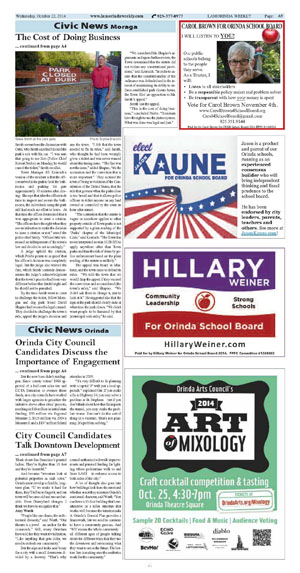|
|
Published October 22nd, 2014
|
The Cost of Doing Business
|
| How a town can spend $43,000 defending a $192 ticket |
| By Sophie Braccini |
 |
| Steve Smith at the park gate. Photo Sophie Braccini |
On the evening of March 9, 2013, people gathered at Rancho Laguna Park in Moraga to enjoy a barbecue, as they have done every Saturday evening for several years. The park is a popular hangout, especially between 4 (or 6) p.m. and dusk when dogs are allowed off leash. The town closes the park after dark to prevent degradation in the remote and bucolic location. That night, Officer Ortiz of the Moraga Police Department arrived at the park 1 hour and 30 minutes after sundown and upon seeing people still at the park proceeded to give them citations.
 One of the cited residents was Steven Smith, who decided to challenge the ticket. More than a year later and after several rounds of legal battles, the resident still feels he was wronged; and the town that defended its regulation has spent $43,000 on legal fees.
One of the cited residents was Steven Smith, who decided to challenge the ticket. More than a year later and after several rounds of legal battles, the resident still feels he was wronged; and the town that defended its regulation has spent $43,000 on legal fees.
 Smith's position is that what the officer did that night was completely at odds with what had been the practice for years. "The big sign at the park says that it closes at dusk," said Smith. He acknowledges that a smaller sign indicates that closing time is one hour after sundown, but says the normal practice was that when park users see the police car coming in, they understand it is time to leave and they start packing their gear.
Smith's position is that what the officer did that night was completely at odds with what had been the practice for years. "The big sign at the park says that it closes at dusk," said Smith. He acknowledges that a smaller sign indicates that closing time is one hour after sundown, but says the normal practice was that when park users see the police car coming in, they understand it is time to leave and they start packing their gear.
 "We often talk to the officer; it is a very casual, small town practice," he added. "That night I had some hot coal in the barbecue and didn't want to leave before it was completely out." Smith remembers the discussion with Ortiz, who Smith says had blocked the park's exit with his car. "I was sure that going to see Bob (Police Chief Robert Priebe) on Monday, he would cancel the ticket," Smith recalled.
"We often talk to the officer; it is a very casual, small town practice," he added. "That night I had some hot coal in the barbecue and didn't want to leave before it was completely out." Smith remembers the discussion with Ortiz, who Smith says had blocked the park's exit with his car. "I was sure that going to see Bob (Police Chief Robert Priebe) on Monday, he would cancel the ticket," Smith recalled.
 Town Manager Jill Keimach's version of the incident is that the officer arrived at the park to lock the bathrooms and parking lot gate approximately 30 minutes after closing. She says that after the officer took time to inspect and secure the bathrooms, the individuals using the park still had made no effort to leave. At that time the officer determined that it was appropriate to issue a citation. "The officers have the right when they see an infraction to make the decision to issue a citation or not," stated the police chief firmly. "Officer Ortiz witnessed an infringement of the town's law and decided to act accordingly."
Town Manager Jill Keimach's version of the incident is that the officer arrived at the park to lock the bathrooms and parking lot gate approximately 30 minutes after closing. She says that after the officer took time to inspect and secure the bathrooms, the individuals using the park still had made no effort to leave. At that time the officer determined that it was appropriate to issue a citation. "The officers have the right when they see an infraction to make the decision to issue a citation or not," stated the police chief firmly. "Officer Ortiz witnessed an infringement of the town's law and decided to act accordingly."
 A judge upheld the citation, which Priebe points to as proof that his officer's decision was completely legal. But the judge also waived the fine, which Smith contends demonstrates the judge's acknowledgment that the town's practice had been very different before that fateful night and he should not be punished.
A judge upheld the citation, which Priebe points to as proof that his officer's decision was completely legal. But the judge also waived the fine, which Smith contends demonstrates the judge's acknowledgment that the town's practice had been very different before that fateful night and he should not be punished.
 By the time Smith went to court to challenge the ticket, fellow Moragan and dog park friend David Shapiro had become his legal counsel. They decided to challenge the town's rule, and appealed the judge's decision. "I felt that the town needed to fix its rules," said Smith, who thought he had been wrongly given a ticket and was never warned about this timing issue. "The fine was not the issue," added Shapiro, "it's the accusation and the conviction that is more important." They accused the town of being in violation of the Constitution of the United States, that the rule that governs when the parks close is too broad and that it allows police officers to ticket anyone on any land owned or controlled by the town an hour after sunset.
By the time Smith went to court to challenge the ticket, fellow Moragan and dog park friend David Shapiro had become his legal counsel. They decided to challenge the town's rule, and appealed the judge's decision. "I felt that the town needed to fix its rules," said Smith, who thought he had been wrongly given a ticket and was never warned about this timing issue. "The fine was not the issue," added Shapiro, "it's the accusation and the conviction that is more important." They accused the town of being in violation of the Constitution of the United States, that the rule that governs when the parks close is too broad and that it allows police officers to ticket anyone on any land owned or controlled by the town an hour after sunset.
 "The contention that the statute is vague or somehow applies to other property outside of Town parks is not supported by a plain reading of the 'Parks' chapter of the Municipal Code," said Keimach. "The Town has never interpreted section 12.08.020 to apply anywhere other than Town parks and thus the risk of abuse by police enforcement based on the plain reading of the statute is unlikely."
"The contention that the statute is vague or somehow applies to other property outside of Town parks is not supported by a plain reading of the 'Parks' chapter of the Municipal Code," said Keimach. "The Town has never interpreted section 12.08.020 to apply anywhere other than Town parks and thus the risk of abuse by police enforcement based on the plain reading of the statute is unlikely."
 The appeal was heard in Martinez, and the town came to defend its rules. "We told the town that we would drop the appeal if they vacated the conviction and reconsidered (the town's rule)," said Shapiro. "We didn't ask them to change it, just to look at it." He suggested also that the sign at the park should clearly state at what time the park closes. "We didn't want people to be harassed by that (municipal code rule)," he said.
The appeal was heard in Martinez, and the town came to defend its rules. "We told the town that we would drop the appeal if they vacated the conviction and reconsidered (the town's rule)," said Shapiro. "We didn't ask them to change it, just to look at it." He suggested also that the sign at the park should clearly state at what time the park closes. "We didn't want people to be harassed by that (municipal code rule)," he said.
 "We considered Mr. Shapiro's arguments and upon further review, the Town determined that the statute did not violate any constitutional provisions," said Keimach. "In order to assure that the constitutionality of the ordinance was defended and in the interest of maintaining its ability to enforce established park closure hours, the Town filed an opposition to Mr. Smith's appeal."
"We considered Mr. Shapiro's arguments and upon further review, the Town determined that the statute did not violate any constitutional provisions," said Keimach. "In order to assure that the constitutionality of the ordinance was defended and in the interest of maintaining its ability to enforce established park closure hours, the Town filed an opposition to Mr. Smith's appeal."
 Smith lost the appeal.
Smith lost the appeal.
 "This is the cost of doing business," concluded Priebe. "Residents have the right to use the justice system. What was done was legal and just."
"This is the cost of doing business," concluded Priebe. "Residents have the right to use the justice system. What was done was legal and just."

|
|
|
|
|
|
|
|
|
| |
|
|
|
|




